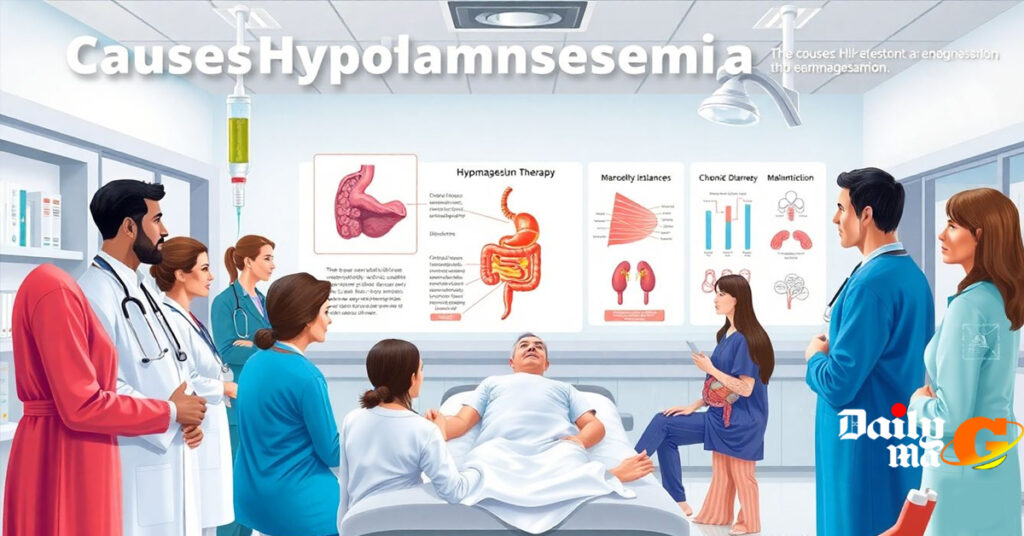Hypomagnesemia is a condition where magnesium levels in the blood fall below normal. It’s common in hospitalized patients and can cause symptoms like muscle weakness, irregular heartbeat, and nervous system issues. If left untreated, low magnesium can lead to serious health problems. Knowing what causes hypomagnesemia helps doctors diagnose and treat it more effectively. The official ICD 10 code for hypomagnesemia is E83.2, which helps in clinical documentation and billing. Recognizing the root cause is vital because it influences how healthcare providers manage the patient. Usually, magnesium shortage impacts muscles, the heart, and the brain, making timely intervention crucial.
Causes of Hypomagnesemia: An Overview
The main reasons for low magnesium fall into three groups: low intake, high loss, or redistribution within the body. Sometimes, more than one factor is at play. It’s a complex condition that needs careful work-up, including patient history and lab tests, to determine exactly what’s going wrong. Addressing these causes can improve patient outcomes and prevent recurrence.
Inadequate Magnesium Intake
Poor Dietary Consumption
Many people don’t get enough magnesium from their diets. Seniors, those with poor nutrition, or individuals on restrictive diets are especially at risk. Foods rich in magnesium, like nuts, whole grains, and leafy greens, might be missing from their plates. Processed foods and refined grains tend to have little magnesium and can contribute to deficiencies. Nutrition experts emphasize that a balanced diet is essential for maintaining healthy magnesium levels.
Malabsorption Syndromes
Certain conditions prevent the intestines from absorbing magnesium properly. Conditions like celiac disease or Crohn’s disease damage the intestinal lining. This damage means magnesium can’t pass into the blood as it should. Sometimes, testing for malabsorption helps identify if this is the cause. When magnesium absorption is impaired, supplementing may not be enough until the underlying issue is treated.

Excessive Magnesium Loss
Renal Loss
The kidneys are responsible for filtering magnesium. Certain kidney problems lead to excessive magnesium wasting. For example, diabetic nephropathy or primary hyperaldosteronism can make the kidneys lose too much magnesium. Diuretics like loop diuretics and thiazides, used to treat high blood pressure, also cause magnesium to be flushed out. Additionally, rare kidney disorders such as Bartter syndrome or Gitelman syndrome result in chronic magnesium loss. Regular monitoring of magnesium in patients taking these medications or with kidney disease is essential.
Gastrointestinal Loss
The digestive tract can also cause magnesium depletion. Chronic diarrhea, severe vomiting, or malabsorption issues—like in tropical sprue—lead to significant magnesium loss. For instance, prolonged episodes of vomiting in babies with hypertrophic pyloric stenosis can drop magnesium levels. Treating the primary GI problem helps restore magnesium balance and prevents further losses.
Medication-Induced Loss
Several drugs can cause magnesium to drop without the patient realizing it. Antibiotics like aminoglycosides and some antifungals are culprits. Diuretics used for blood pressure and heart failure can deplete magnesium. Proton pump inhibitors, often used for acid reflux, have also been linked to low magnesium levels when used long-term. Doctors should watch for symptoms and check magnesium levels when patients are on these medications, especially if they develop symptoms of deficiency.
Redistribution of Magnesium within the Body
Alcoholism
Heavy alcohol use is a common cause of magnesium deficiency. Alcoholics often don’t eat enough magnesium-rich foods, and alcohol makes kidneys lose more magnesium. It also damages the kidneys’ ability to retain magnesium. Screening and replacing magnesium in heavy drinkers can prevent serious complications.
Refeeding Syndrome
When severely malnourished people start eating again, their electrolyte levels can shift suddenly. This refeeding process pulls magnesium into cells, making blood magnesium levels drop quickly. It’s a dangerous process that requires close monitoring. Preventing refeeding syndrome involves slow dietary reintroduction and electrolyte support.
Acute Stress and Illness
In critical illness or trauma, magnesium can move from the blood into cells due to stress hormones and inflammatory signals. Conditions like burns or sepsis upset the normal balance of magnesium. Managing the underlying illness and providing magnesium supplements can help restore normal levels.
Diagnostic Approach to Underlying Causes
To find out what’s causing hypomagnesemia, doctors rely on lab tests. Checking serum magnesium gives an initial snapshot. Renal function tests and urinary magnesium levels reveal if the kidneys are losing too much magnesium. Additional tests might include screening for malabsorption or hormone levels if needed. A detailed patient history helps piece together risk factors and triggers.
Conclusion
Low magnesium levels can result from several factors, including poor diet, increased loss, or redistribution within the body. Identifying the root cause is key to effective treatment. Regular monitoring, especially in high-risk groups like those on diuretics or with kidney disease, is vital. Tackling the underlying problem improves health and prevents dangerous complications. Properly diagnosing and managing hypomagnesemia makes a real difference in patient outcomes.



34 Comments
İstanbul tesisatçı su kaçak tespiti Maltepe’deki ofisimdeki su kaçağını bulmak hiç kolay değildi ama bu ekip harika çalıştı. https://saudeamesa.com.br/uskudar-tesisatci-petek-temizleme/
Etiler su kaçağı tespiti Tespit için gelişmiş ekipman kullanmaları etkileyiciydi. https://www.weddcation.com/2012/10/
Купить диплом любого института. Приобретение документа о высшем образовании через проверенную и надежную фирму дарит ряд преимуществ для покупателя. Это решение дает возможность сберечь время и существенные деньги. socialvockmarkingsitelist.copiny.com/question/details/id/1083578
Актуальные промокоды на Мостбет!
Играешь на Мостбет? Mostbet промокоды http://verspk.ru/css/pages/?promokod_mostbet_pri_registracii_na_segodnya.html Не упусти действующие промокоды! Они дают подарки за регистрацию, фрибеты и фриспины в казино. Вводи промокод при создании аккаунта или в личном кабинете и получай выгодные преимущества уже сегодня. Успей активировать — предложения ограничены!
Online casinos have awesome signup bonuses.
plinko
The live baccarat table is so classy!
fishin frenzy
hfcgpw
Unlock exclusive rewards with a special code for 1xBet and boost your betting journey. New users can claim a generous welcome reward by entering the promo code during sign-up. This can include extra credits, deposit bonuses, and other exciting benefits. Don’t miss your chance to make the most of your deposit. Just use the right 1xBet promo code and enjoy a enhanced betting experience today!
https://talhamushtaque.blogspot.com/2025/05/1xbet-promo-code-today-bonus-100-up-to.html 1XBET Coupon Check
Looking for a way to boost your profits? Use the 1xBet promo code to unlock a huge welcome bonus. When you sign up, simply enter the promo code to receive bonus money on your first deposit. It’s a perfect start for new players to experience sports betting or online casino games with more balance. Don’t miss this exclusive deal — activate your 1xBet promo code now and win more!
https://lukasczvo77772.tinyblogging.com/1xbet-promo-code-no-deposit-bonus-100-up-to-130-78682094 1XBET Promo Code Casino
Хотите получить больше при старте? Введите промокод на Парибет и получите щедрый бонус. Новый игрок может ввести код при открытии счета, чтобы получить дополнительный баланс. Это отличная возможность для новичков ознакомиться с платформой с дополнительными ресурсами. Не упустите этот момент — введите промокод при регистрации и начинайте с бонусом!
http://acontinents.nnov.org/acontinentsss/promokod_pari_ru__pari_ru______bonus_do_15_000___.html Paribet Промокод При Регистрации
Приглашаем отправиться в речные круизы из Москвы на комфортабельных теплоходах по всей России Речные круизы из Москвы
Our SEO services include International Link Building Çevrimiçi kurs – Türkiye’de Kumar (Casino) için SEO. Telegram – @aysu_kaya
Секс онлайн чат — это виртуальная зона для взрослого общения. Здесь вы можете найти партнёра, которые ищут новых ощущений. Онлайн секс-чат обеспечивает безопасность и яркие эмоции. Начинайте беседу и отдайтесь страсти без лишних ожиданий.
https://rt.gay-videochat.com/ смотреть порно чат
продвижение сайта цена https://prodvizhenie-sajtov-v-moskve.ru .
With a 1x Bet Free Promo Code, you get instant rewards right after signing up. This gift code unlocks free bets that can be used on your favorite sports events. It’s simple to activate and comes with zero deposit required. Enter your bonus password and start playing smart today!
https://plusgestio.com/pag/1xbet_today_promo_code_bonus_up_to_130.html 1XBET Best Promo Codes
This was exactly what I was looking for. Very helpful post!
The bonus terms are fair and easy to follow.
vipzino bonus code
Промокод Фонбет — прекрасный способ начать с преимуществом. Активируйте купон при первом входе, и вы получите бонус. Фонбет периодически выпускает бонусные коды, так что следите за обновлениями. Это отличный старт для первых пользователей!
http://w77515cs.beget.tech/2025/05/18/promokod-fonbetru-fonbetru-bonus-do-15000rub.html Фонбет Промокод
Online casinos have clear game guides.
book of ra deluxe gratis
buy google ad account sell google ads account
dv2dn5
Новым пользователям Melbet предоставляется эксклюзивный Melbet Промокод При Регистрации. Введите его при создании профиля и активируйте привлекательный подарок. Это отличный способ начать путь в беттинге с усилением баланса. Промокод открывает доступ к фрибетам, которые обойдут стороной без его использования.
https://moskvic.actieforum.com/t4210-topic#7553 Промокод Для Мелбет
699rht
представительство юриста в арбитражном суде услуги юриста в арбитражном суде
l9pcpt
5vtjxx
kvxrro
htnar6
dqeohy
There are definitely lots of particulars like that to take into consideration. That may be a great point to carry up. I supply the thoughts above as general inspiration however clearly there are questions like the one you bring up where an important thing will probably be working in trustworthy good faith. I don?t know if finest practices have emerged round issues like that, however I am certain that your job is clearly identified as a fair game. Each girls and boys feel the affect of just a second’s pleasure, for the rest of their lives.
cv5ava
q8xzxi
самое увлекательное я взираю тут детское порно
r4g7up